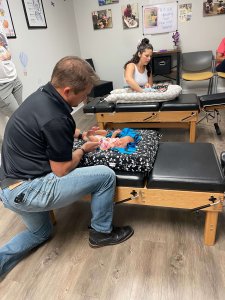 As a parent, watching your child grow and reach new milestones is a mix of excitement and concern. Each first – from rolling over to saying their first words – feels monumental, but the worry often lingers: Are they developing on track? If your child isn’t meeting milestones at the same pace as their peers, or healthcare providers have raised concerns, you’re not alone. According to the CDC, 1 in 6 children faces developmental delays, and those numbers are rising in today’s fast-paced, high-stress world.
As a parent, watching your child grow and reach new milestones is a mix of excitement and concern. Each first – from rolling over to saying their first words – feels monumental, but the worry often lingers: Are they developing on track? If your child isn’t meeting milestones at the same pace as their peers, or healthcare providers have raised concerns, you’re not alone. According to the CDC, 1 in 6 children faces developmental delays, and those numbers are rising in today’s fast-paced, high-stress world.
The “Perfect Storm” Behind Developmental Delays
Developmental delays don’t just appear out of nowhere or result from “bad genetics.” Instead, they often stem from what we call “The Perfect Storm” – a combination of factors that influence early nervous system development:
- Prenatal Stress and Fertility Challenges: Fertility treatments, pregnancy complications, or maternal stress can impact your child’s developing nervous system even before birth.
- Birth Interventions: C-sections, forceps, vacuum extractions, or prolonged labor can create stress and trauma in the critical brainstem area, disrupting development.
- Early Environmental Stressors: Early antibiotic use, toxin exposure, or nutritional challenges can further influence your child’s trajectory.
Why Progress May Plateau in Traditional Therapies
If your child is in occupational, speech, or physical therapy, you may notice periods where progress seems to slow down. That’s because many traditional approaches focus on surface-level issues, like muscles or speech mechanics, without addressing the nervous system, which drives all development.
Think of it like trying to improve a computer’s performance by upgrading the screen instead of fixing the processor. Without optimizing the “control center,” results remain limited.
The Nervous System: Your Child’s Developmental Foundation
Your child’s nervous system acts as the “Air Traffic Control” for their body, coordinating everything from motor planning to sensory processing. Development occurs in a precise, hierarchical sequence, much like constructing a house:
- Autonomic Nervous System (Foundation): Regulates breathing, digestion, and stress response.
- Neuro-Motor System (Walls): Governs basic movement patterns and coordination.
- Gut & Immune System (Roof): Impacts overall health and brain development.
- Brain-Based Functions (Finishing Touches): Handles speech, emotional regulation, and social interaction.
When this sequence is disrupted by stress, trauma, or interference, the effects cascade, leading to:
- Delayed milestones (e.g., sitting, crawling, walking)
- Speech and communication challenges
- Sensory processing difficulties
- Poor coordination and balance
What You Can Do as a Parent
- Trust Your Instincts: If something feels off, don’t ignore it. Early action can make all the difference during this critical window of development.
- Look Deeper: Seek care that evaluates and supports the root cause of delays, not just the symptoms.
- Consider a Neurological Assessment: Advanced tools like INSiGHT Scans can measure nervous system function, pinpoint areas of dysfunction, and provide a roadmap for progress.
How We Can Help
At New Hope Chiropractic, we specialize in neurologically-focused chiropractic care that addresses the underlying causes of developmental delays. Our INSiGHT Scans provide real, measurable insights into your child’s nervous system health, allowing us to create personalized plans to help them thrive.
If you’re not local to us, check out the PX Docs directory to find a provider near you who shares our approach.
Moving Forward with Confidence
Your child’s development isn’t set in stone. By addressing the nervous system and building a strong foundation, we can help them not only catch up but thrive. Whether you’ve noticed subtle delays or your child has been in traditional therapies for years, a neurological perspective might be the missing link.
Don’t wait, wondering if your child will “grow out of it.” Contact New Hope Chiropractic today to learn how we can help your child reach their full potential! ?

